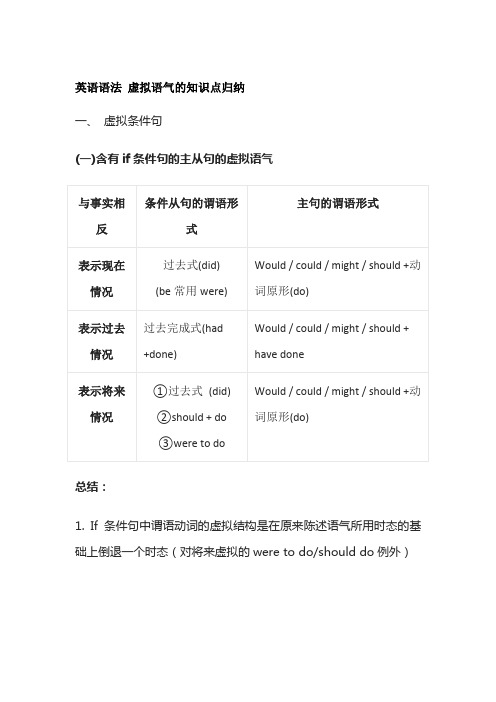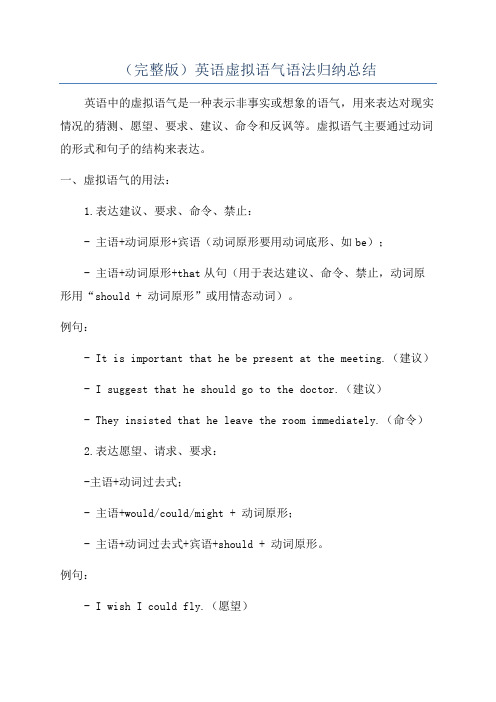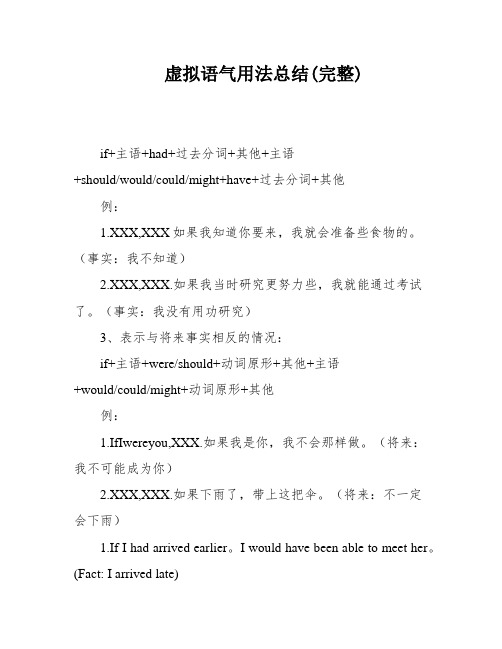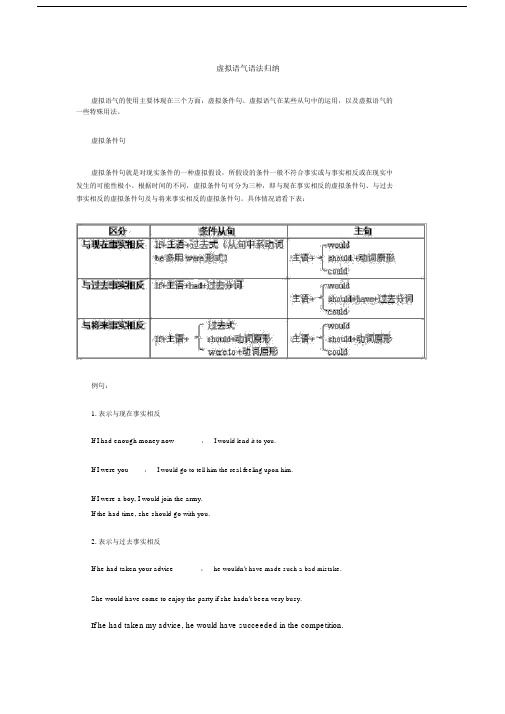虚拟语气归纳-整理版
英语语法 虚拟语气的知识点归纳

英语语法虚拟语气的知识点归纳一、虚拟条件句(一)含有if条件句的主从句的虚拟语气总结:1. If 条件句中谓语动词的虚拟结构是在原来陈述语气所用时态的基础上倒退一个时态(对将来虚拟的were to do/should do例外)2. 主句要借助于情态动词的过去式,后跟动词原形(现在或将来)或have done(过去);if条件句中只出现一个情态动词,即对将来虚拟的should.3.做此类题目时一定要分清是从句还是主句谓语动词的虚拟,还要把握好时态。
注意:1. 在虚拟条件从句中,动词“be”的过去时态一律用”were”,不用was。
2. 在虚拟条件状语中如果有were, should, had这三个词中任何一个,可省略if,把这三个词提到主语之前, 变成:were/should/had +主语+剩余成分。
3.在虚拟条件状语从句中,省略连词的倒装形式的句首不能用动词的缩略形式。
如我们可说Were I not to do., 而不能说Weren‘t I to do。
4.在表示与将来事实相反的条件句中,只能用should,而不能用would,could和might 等。
5.主句中的should通常用于第一人称,would,could以及might 可以用于各种人称eg :①If I were a bird, I could fly in the air.如果我是一只小鸟,我就能在空中飞行。
②I wish I could pass the examination.我希望我能通过考试。
在虚拟条件句中,对于与将来事实相反的情形,请注意以下几点:(1)条件从句表示的内容与将来事实相反,实为对将来情况的推测,用过去时表示虚拟;(2)条件从句谓语除用过去式外,有时也用“should+动词原形(表示可能性极小,常译为“万一”)”或“were to+动词原形(表示与将来事实相反的假设)”;(3)条件从句使用“should+动词原形”这样的谓语形式时,主句谓语除可用“should (would, could, might)+动词原形”这样的虚拟语气形式外,也可用直陈语气或祈使语气。
(完整版)英语虚拟语气语法归纳总结

(完整版)英语虚拟语气语法归纳总结英语中的虚拟语气是一种表示非事实或想象的语气,用来表达对现实情况的猜测、愿望、要求、建议、命令和反讽等。
虚拟语气主要通过动词的形式和句子的结构来表达。
一、虚拟语气的用法:1.表达建议、要求、命令、禁止:- 主语+动词原形+宾语(动词原形要用动词底形、如be);- 主语+动词原形+that从句(用于表达建议、命令、禁止,动词原形用“should + 动词原形”或用情态动词)。
例句:- It is important that he be present at the meeting.(建议)- I suggest that he should go to the doctor.(建议)- They insisted that he leave the room immediately.(命令)2.表达愿望、请求、要求:-主语+动词过去式;- 主语+would/could/might + 动词原形;- 主语+动词过去式+宾语+should + 动词原形。
例句:- I wish I could fly.(愿望)- I would appreciate it if you could help me.(请求)3.表示虚拟条件:- If条件从句中的谓语动词用过去完成时,主句用would/should/might/could + have + 过去分词;- If条件从句中的谓语动词用过去时,主句用would/should/could + 动词原形。
例句:- If I had known his phone number, I would have called him.(虚拟条件)- If you had listened to me, we could have finished the project earlier.(虚拟条件)4.表达建议、要求、祝愿:- If only内部称述 + 主语 + 过去式。
高中英语虚拟语气的用法归纳

高中英语虚拟语气的用法归纳以下是高中英语虚拟语气的用法归纳:虚拟语气是一种特殊的动词形式,表示假设、愿望、建议、命令、猜测等非真实的情况。
一、基本用法1. 与现在事实相反条件从句:If + 主语 + 动词过去式(be 动词用 were)主句:主语 + would/should/could/might + 动词原形例句:If I were you, I would study harder. (如果我是你,我会更努力学习。
)Wouldn't life be boring if we had everything we wanted? (如果我们想要什么就有什么,生活岂不是很无聊?)2. 与过去事实相反条件从句:If + 主语 + had + 过去分词主句:主语 + would/should/could/might + have + 过去分词例句:If I had known your phone number, I would have called you. (如果我知道你的电话号码,我就给你打电话了。
)Couldn't you have done better if you had tried harder? (如果你再努力些,难道不能做得更好吗?)3. 与将来事实相反条件从句:① If + 主语 + 动词过去式② If + 主语 + were to + 动词原形③ If + 主语 + should + 动词原形主句:主语 + would/should/could/might + 动词原形例句:If it rained tomorrow, we would stay at home. (如果明天下雨,我们就待在家里。
)If she were to come here tomorrow, I would be very happy. (如果她明天来这儿,我会非常高兴。
)If he should fail in the exam, how disappointed his parents would be!(要是他考试不及格,他父母该多失望啊!)二、固定搭配1. wish 后的宾语从句与现在事实相反:从句用一般过去时与过去事实相反:从句用过去完成时与将来事实相反:从句用 would/could + 动词原形例句:I wish I were as tall as you. (我希望我和你一样高。
(完整版)虚拟语气详解

虚拟语气详解虚拟语气表示说话人的主观愿望(往往与客观事实相反),或是表示假象和猜测。
虚拟语气无论从形式上还是时态上都比较复杂,需要归类记忆。
虚拟语气大体分为三类:(1) be型虚拟(2) were型虚拟(3) if 条件句及主句虚拟下面会详细说每种虚拟形式的特征和规律,考试时先判断属于哪种虚拟类型,剩下的皆是套路~(1)be型虚拟(基本是套路)形式:should + 动词原形,should可以省略用法:1)表示“命令、建议、要求”等意义词语之后的宾语从句用be型虚拟,常见的词如下: demand, desire, insist, order, ask, command, propose, recommend, suggest, prefer, require, request等最常见的形式是这类动词后面接着一个宾语从句,则宾语从句的谓语部分要用(should)+ 动词原形来虚拟例: We demand that the meeting(should)be postponed.The manager suggested that we (should) work together.注意:有时候你所见到不一定是上述动词引导的宾语从句,而是由上述词变体后所引导主语从句(it做形式主语,如:it is advised/ suggested/ requested/ ordered/ proposed that…)、表语从句或同位语从句例如:It is required that the students (should) learn a foreign language. (主语从句) The requirement is that all the equipment in the meeting room (should) be checked twice before. (表语从句)We didn’t stand for his proposal that the meeting (should)be postponed. (同位语从句)只要看到句中有上述动词或其变体,不管词性怎么变、句型怎么变,都用be型虚拟!特例:suggest和insist这两个比较特殊,当suggest作“暗示、表明、说明”讲,insist作“坚持说”讲,后面一般跟的是客观事实,不需要虚拟~这是一个比较重要的考点,体会下面两组句子:We all suggest that a lab (should) be built. 我们都建议建一个实验室。
英语虚拟语气语法归纳总结

虚拟语气:表示说的话不是事实,不可能发生或者说可能性很小的情况,表达一种愿望、建议、假设。
一、条件状语从句中的用法简单记法:if were/did, would doif had done, would have doneif were to do/should do, would do举例:If I were you, I would do nothing about it.If you had taken your teacher’s advice, you wouldn’t have made such a mistake.If it were to/ should rain tomorrow(表示降水率很低),they wouldn’t go shopping.附注:虚拟语气,条件状从倒装状语从句中,去掉if, 提前were/ had/ should如:If I were you, I would give up.→Were I you, I would give upIf you had taken the advice, you would have….→Had you taken the advice, you would have…If the world should come to an end,……→Should the world come to an end……另外,without, but for, otherwise构成的条件状语从句中,也有含蓄的虚拟语气But for the popularization of electricity, we would lead a whole different life today.(popularization 普及,publicity 宣传)Without your help, I would have failed.We’ll go earlier, otherwise we wouldn’t get a seat. (表示可能性小)但其实,高中英语考试也常考:错综虚拟语气条件句即:假设条件状从发生的时间与所假设的谓语动词不一致,此时,主句和从句要根据各自的时间而定。
虚拟语气用法总结(完整)

虚拟语气用法总结(完整)if+主语+had+过去分词+其他+主语+should/would/could/might+have+过去分词+其他例:1.XXX,XXX如果我知道你要来,我就会准备些食物的。
(事实:我不知道)2.XXX,XXX.如果我当时研究更努力些,我就能通过考试了。
(事实:我没有用功研究)3、表示与将来事实相反的情况:if+主语+were/should+动词原形+其他+主语+would/could/might+动词原形+其他例:1.IfIwereyou,XXX.如果我是你,我不会那样做。
(将来:我不可能成为你)2.XXX,XXX.如果下雨了,带上这把伞。
(将来:不一定会下雨)1.If I had arrived earlier。
I would have been able to meet her。
(Fact: I arrived late)2.If he had XXX my advice。
he would not have made such a mistake。
(Fact: He didn't listen to me)3.If he were to come here tomorrow。
I would talk to him。
(Fact: It's XXX he will come)In expressing ns。
orders。
requests。
etc。
the subjunctive mood is often used in the object clause。
with the verb in the form of "should + infinitive," which can be omitted.Other uses of XXX:1.The subjunctive mood is used in the object clause after "wish" to express a XXX fact。
(完整版)虚拟语气(表格整理)

虚拟语气(Subjunctive Mood)1.if(条件状语从句)2.wish(宾语从句)/if only(要是……就好了)3.would rather+ 从句(表示宁愿某人在现在或将来要做某事或过去做过某事)4.as if/as though,even if/though + 从句--------------------------------------------------------------------- 5.在表示“坚持、要求、命令、建议”之类的动词后的宾语从句中,用“(should)+动词原形”。
6.虚拟语气用于主语从句7.虚拟语气用于表语从句、同位语从句 [用(should)+动词原形]8.虚拟语气用于定语从句这种从句常用在It is (high) time (that)...句型中,定语从句的谓语动词用过去式或should + 动词原形(should不能省略,be用were来表示),意【好题珍藏】1.Grace doesn’t want to move to New York because she thinks if she there, she wouldn’t be able to see her parents very often. (Pano M6 P16:15) A.lives B.would live C.has lived D.were to live【解析】主句说明了客观事实,if从句是对将来事实的假设。
见“1.if(条件状语从句)——与将来事实相反”。
【答案】D2.If Mr.Dewey present,he would have offered any possible assistance to the people there. (Pano M6 P16:16) A.were B.had been C.should be D.was【解析】见“1.if(条件状语从句)——与过去事实相反”。
(完整版)虚拟语气语法归纳..doc

虚拟语气语法归纳虚拟语气的使用主要体现在三个方面:虚拟条件句、虚拟语气在某些从句中的运用,以及虚拟语气的一些特殊用法。
虚拟条件句虚拟条件句就是对现实条件的一种虚拟假设,所假设的条件一般不符合事实或与事实相反或在现实中发生的可能性极小。
根据时间的不同,虚拟条件句可分为三种,即与现在事实相反的虚拟条件句、与过去事实相反的虚拟条件句及与将来事实相反的虚拟条件句。
具体情况请看下表:例句:1.表示与现在事实相反If I had enough money now,I would lend it to you.If I were you,I would go to tell him the real feeling upon him.If I were a boy, I would join the army.If the had time, she should go with you.2.表示与过去事实相反If he had taken your advice,he wouldn't have made such a bad mistake.She would have come to enjoy the party if she hadn't been very busy.If he had taken my advice, he would have succeeded in the competition.3.表示与将来事实相反I would go shopping with you if it were to be Sunday tomorrow.If he were to be given another chance to do it again,he could certainly achieve more.If it were to rain tomorrow, the football match would be put off.1.虚拟条件句的倒装在虚拟条件句中,为了强调所假设条件的虚拟性,或突出说话人的一种主观愿望,虚拟条件句可用倒装结构。
- 1、下载文档前请自行甄别文档内容的完整性,平台不提供额外的编辑、内容补充、找答案等附加服务。
- 2、"仅部分预览"的文档,不可在线预览部分如存在完整性等问题,可反馈申请退款(可完整预览的文档不适用该条件!)。
- 3、如文档侵犯您的权益,请联系客服反馈,我们会尽快为您处理(人工客服工作时间:9:00-18:30)。
表示对(过去、现在、将来)客观现实情况的虚拟
1.条件状语从句
虚拟语气在if引导的条 件句中的用法三点:
从句(条件)
主句(目的)
表示于现在事实相反的 虚拟条件句
lf+主语+动词的过去式(be用were)
If I were a boy, I th ink that I could understand how it feels to love a girl.
主 语+would(shouldcould
might)+动词原型
表示与过去事实相反的 拟条件句
If+主语+had+动词的过去分
词
I did not see your sister at the meeting. If she had come, she would have met my brother
注意:1.在as if/as though句中,如果有可能成为事实,用陈述 语气。例:He looks as if he going to be ill.
2.as though或as if引导的状语从句,从句主语和主句主 语相同时,从句中可省略主语和部分谓语。
3. If only引起的感叹句中的虚拟语气
主 语+would(should could might)+have+动词的过去分词
表示与将来事实相反的 虚拟条件句
If+主语+should(were to)+
动词原型/动词的过去式
主 语+would(could should might)+动词原型
If it were to/ should snow tomorrow, we would put off the visit to the Great Wall.
2•表示与过去事实相反,谓语动词用过去完成时。
3•表示与将来事实相反
1.When a pencil is partly in a glass of water, it looks as if it were broke n.
2.He is talk ing so much about America as if he had bee nthere
倒装语序的情况
中的连词if省去,而将had,should,were等助动词提到主语 之前。
例: 原句:If she were youn ger,she,would do it.
去if:Were she younger,she,would do it.
含蓄条件句
有时虚拟条件句并没用if从句表示出来,而是用介词短语
对过去情况的虚拟:从句谓语动词用过去元成时,或would,could,
might+现在完成时。
I wish that you had n'had such a bad headache because I a sure that you would have enjo yed the con cert
注意:1.右某人愿自己做某事,would rather后用动词原型
2.would rather…..than中用动词原型
二、Be式
均以“should+动词原型”表示这种语气,“should”常被省略。
1.表示建议、命令、请求或其它主观观点和态度
混合条件句——主从句 时间不一致的情况下的 虚拟语气
有时条件从句中的动作与主句中的动作,发生的时间不一致, 这是动作的形式应根据它所表示的时间加以调整。
例.
Had you listened to the doctor, you would be all right now
条件从句中省略if采用
在if引导的表示虚拟的条件状语从句中,有时可以把虚拟条件
对将来情况的虚拟:从句谓语“would/should/could/might+动词原
形”。
Would rather,had rather,后的宾语从句 中的虚拟语气
谓语动词用过去式表示与现在或将来相反,用过去完成式表示与 过去事实相反。表示“宁愿做什么”或“对过去做的事的懊悔”。
例.I would rather youanything about it for the time being
(without,but for) 或连词otherwise,or或上下文来表示。
例
1.I was ill that day, otherwise I would have taken part in the sports meet
2.But for water, it would be impossible to live in the earth.
由 “providing(that)/provided(that)/on con diti onthat/suppose
(that)/supposing
(that)”引导的条件从 句
根据情况,1•可以用虚拟语气。
例:suppose/supposing that it rained,we shouldn'go out.
2•也可以用陈述语气。
例:They are willing to surrender provided they are given free pard on..
2.方式状语从句
虚拟语气在as if/as
though引导的方式状语 从句中
1.表示与现在事实相反或对现在情况有怀疑,谓语动词用过去 式。
4. wish /hope/would rather/had better后的宾语从句中
动词wish/holp后的
宾语从句中的虚拟语 气
对现在情况的虚拟:从句谓语动词用过去式或过去进行式。
How I wish every family had a large house with a beautiful garde n.
If only引出感叹句,意 思是“要是…••多好”, 表示说话人的一种愿 望。
例:If only he didn'drive so fast!(现在)stop.(将来)
Look at the terrible situation 1 am in !if only 1 had followed your advice(过去)
